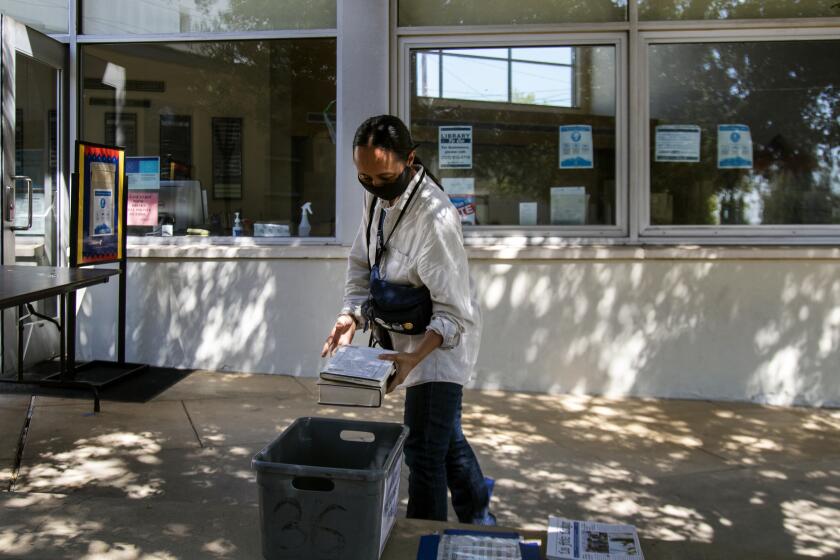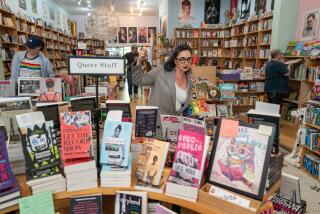Opinion: How contact tracing with librarians showed me the best of team science
- Share via
My COVID-19 anxiety dream starts off innocently. I’m talking with Dr. Fauci and of course we are wearing masks. Then I accidentally trip him and he tumbles, mask falling off, all hell breaking loose in some vague, infectious, dystopian way like Alice down the rabbit hole. I believe the dream is a metaphor for our epic collective failure in responding to the pandemic.
As an epidemiologist, I am acutely aware of how chronic disparities in the U.S. have imposed a far greater risk of COVID-19 on some communities. But I have also had a chance to see our potential to deepen civic society, if we get our act together.
I’m a volunteer in San Francisco doing contact tracing alongside librarians and other city workers redeployed to this duty. Before each shift, we have team “in briefs” to discuss changes to the protocols and which people to contact first . Then we spread out and make our calls, texting one another over an app as we do.
Our texts are full of camaraderie and willingness to solve myriad problems that appear one after the other. Some are easy, like stepping up to take a new incoming call. Others are much more challenging, such as trying to help someone in a domestic violence situation determine where to stay, or arranging for a workplace investigation team to call an employer who insists their staff member has been given a false positive and wants them to return to work.
After each shift we take time to talk about what went right, what went wrong and which situations require follow-up. During these “out briefs,” we see each other’s pets and children in Zoom backgrounds and joke about who is going to have the best post-shift dessert or well-deserved cocktail.
The city workers are doing this full time, whereas I am a more occasional volunteer. I have found these contact tracing shifts uniquely inspiring. I think it’s because of the way the librarians have made this space their own while working with everyone else as a team — an investigative and communications team. As one librarian commented when we were discussing the intricacies of how to obtain food vouchers: “This is our job, bringing information to people. This is why we are librarians.”
The Los Angeles Public Library’s buildings remain COVID-closed. But in the pandemic, librarians’ creativity has blossomed online and many new doors for patrons have opened.
I feel admiration when I hear this and am reminded of why I am an epidemiologist. We investigate problems, we share information, and we tailor our recommendations to the risks we have identified. But in this contact tracing experience there is explicit collaboration.
While familiar to me from past public health jobs, these methods seem natural to the librarians. Librarians know more about the city and its neighborhoods, such as who the people experiencing homelessness are, where single residency hotels are and why some people are so afraid to use public health services, than I ever would have imagined.
The contact tracing work feels like what team science is supposed to be. I work in implementation science, with a focus on adapting interventions to meet the needs of diverse populations. Recently, we started in-depth interviews with people who face the most significant challenges managing self-isolation or quarantine, getting tested and navigating job pressures. This research is a direct result of my volunteer experiences with the librarians who approach their contact tracing with intentional empathetic inquiry.
Just before the first shelter-in-place orders were issued, I attended the San Francisco Public Library’s Night of Ideas, which, with other libraries across the country and around the world, showcases the big ideas of our time through debates, live music and food. Now, in this second shelter-in-place restriction, a night like this feels far away.
However, I am looking forward to a future with this type of gathering, hopefully in some library. Perhaps Dr. Fauci will be there too, talking to the librarians about contact tracing, team science and pushing forward ideas about what makes effective community-based public health. If I’m lucky, I will dream about it.
Margaret Handley is an epidemiologist and a professor at UC San Francisco, where she co-directs the Partnerships for Research in Implementation Science for Equity Center.
More to Read
A cure for the common opinion
Get thought-provoking perspectives with our weekly newsletter.
You may occasionally receive promotional content from the Los Angeles Times.











